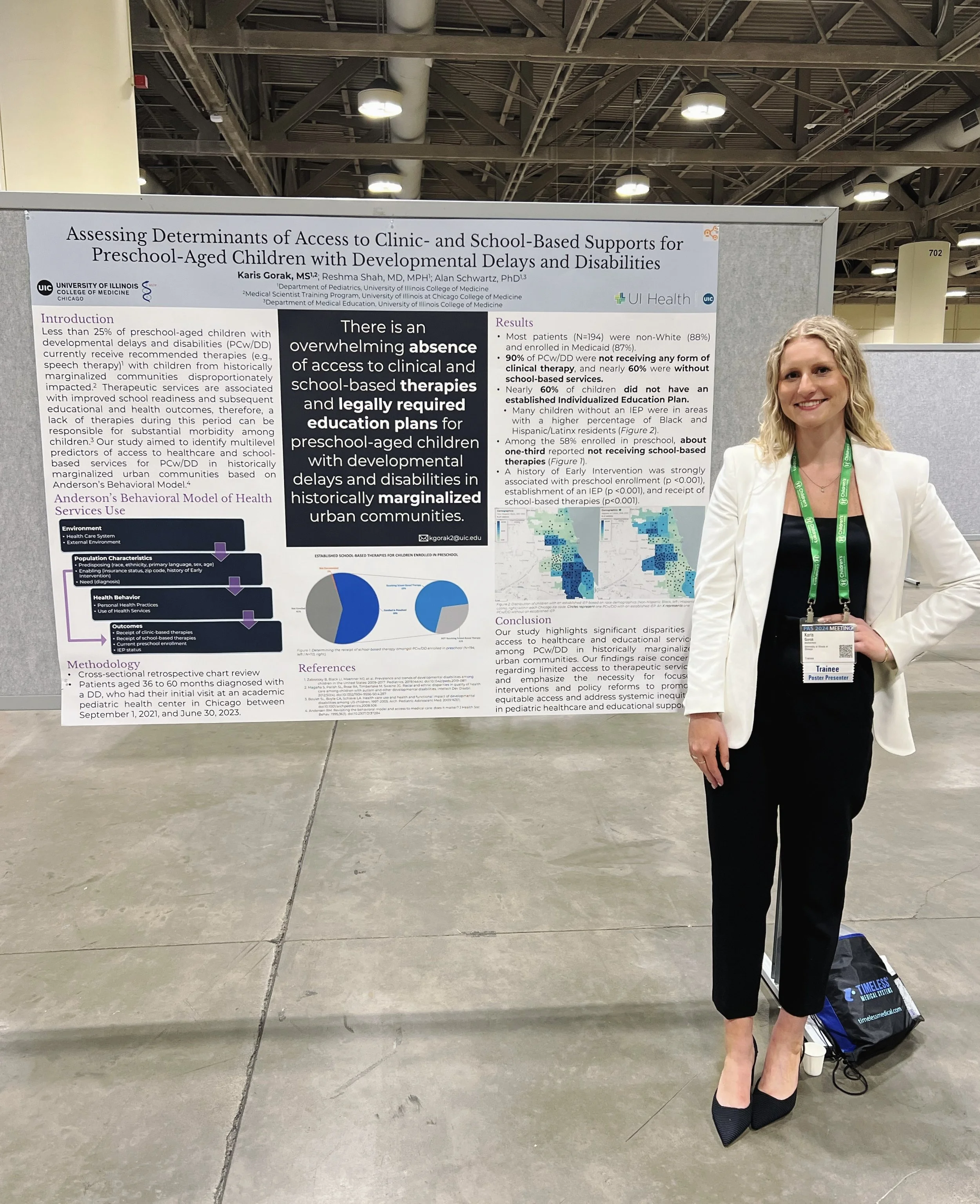
Resources
Members of the Preschool & Me team virtually presented projects for the UIC Pediatrics Summer Scholars Program.July 29th, 2024; Chicago, Illinois
The Preschool and Me team’s posters at UIC’s College of Medicine Annual Research Forum in January, 2025. Click the images to download the poster PDFs.
Karis Gorak presents at the 2024 Pediatric Academic Societies Conference. May 5th, 2024; Toronto, Canada
Click the image to download the poster PDF.
Natalia Matula presents at the 2024 University of Illinois Undergraduate Research Forum. April 14th, 2024; Chicago, Illinois
Click the image to download the poster PDF.
Educational-Clinical Linkage to Improve Health Equity for Children with Developmental Delays and Disabilities from Marginalized Communities:
Societal and structural inequities have resulted in longstanding health care disparities among Black, Hispanic, and low-income preschool-age children with developmental delays and disabilities (PCw/DD) depriving them of educational and therapeutic services which foster development and improve later academic, economic, and health outcomes. Studies also indicate when children receive these needed services, their parents benefit with improvements in mental health, stress, and quality of life. The scientific objectives of this proposal are to 1) test effective strategies to increase access to ECSE services among PCw/DD from historically marginalized communities; and 2) characterize potential mechanisms by which such strategies may lead to improved multilevel health outcomes. Preschool and Me (PreM) is a novel community clinical linkage (CCL) designed for clinical settings serving historically marginalized communities. Combining key components of CCLs with a personalized medical-education care plan and remote navigator support, PreM targets different levels of influence impacting therapeutic access identified in our prior research. In pilot testing, PreM was feasible to deliver, acceptable to parents, and demonstrated preliminary efficacy on completed ECSE evaluations among families attending a pediatric clinic serving largely Black and Hispanic families from low-income communities. Thus, this R01 application proposes to utilize a hybrid effectiveness-implementation approach to test PreM in two models of real-world service delivery conditions. Participants (n=320) will be randomized to either: 1) 6 months of PreM (intervention group) or 2) a waitlist control arm beginning the intervention after a 6-month delay. We will follow all participants for 12 months with data collection occurring at 4 timepoints (baseline, 3-, 6- and 12-months). Our specific aims are to test effectiveness of PreM on indicators of ECSE access (primary) and child-, parent-, family- and health service outcomes (secondary); examine theoretically derived mediators of intervention effects using a mixed methods approach; and explore social determinants of health as potential moderators. We will also simultaneously conduct a mixed methods implementation evaluation focusing on implementation outcomes to serve as indicators for implementation success; measures of implementation quality; and intermediate outcomes to understand and address successes and failures in relation to clinical outcomes. The results of this project have the potential to: 1) advance scientific knowledge about how gaps and delays in educational and therapeutic services impact health outcomes among PCw/DD and their families; 2) identify mechanisms to increase access to ECSE services and address longstanding health care disparities; and 3) support effective implementation of educational-clinical linkage models within pediatric clinical settings serving historically marginalized communities which can be utilized to improve health outcomes for families and their children with a range of health conditions.













